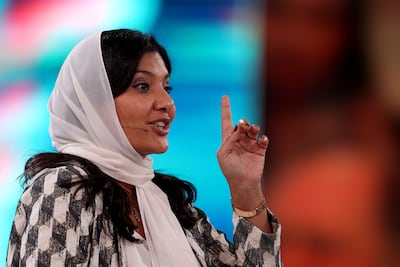Launched by Crown Prince Mohammed bin Salman, Saudi Arabia's Vision 2030 has opened doors for women in the kingdom since its launch in 2016.
From being allowed to drive, to working in sectors inaccessible to them before, including aviation, the military, entertainment, law and sports, Saudi women already outnumber men in some small and medium-sized enterprises.
Saudi women comprise 33.6 per cent of the labour workforce, the General Authority for Statistics announced in March, helping to push unemployment levels to 20-year lows.
advisor on social development and gender equality
In October, Saudi women will be provided grants to buy boats and complete training to operate tourism businesses in the Red Sea and the Gulf.
Saudi women are leading youth across the board, upholding key ministerial positions in the government. Princess Haifa bint Mohammed Al Saud was appointed as Saudi Arabia’s vice minister of tourism by royal decree earlier this year.
The majority of staff working in MISK, a non-profit foundation established by Crown Prince Mohammad to help Saudi youth, are women.

“Gender equality in the kingdom has been on the fast track. Since the announcement two years ago, we’ve seen our recruits now on the front lines," Princess Reema bint Bandar, Saudi Arabia’s ambassador to the US, said during the World Defence Show in Riyadh earlier this year.
"We are a young nation, with two-thirds under 35 and it’s impossible not to allow women to participate in the military. They are vital to the success of the kingdom,” Princess Reema said, adding that female essential workers helped to lower mortality and infection rates in the country.
Women’s participation rate in the job market reached 35.6 per cent in the second quarter of the year, exceeding the 30 per cent target set by Vision 2030.

Women now have equal access to financial resources, ownership of property and pensions.
The progress on gender equality in Saudi Arabia is "advancing in leaps and with high speed," making up for years of stagnation when women were side-lined and under-appreciated, says Maha Akeel, strategy and policy advisor on social development and gender equality in Saudi Arabia.

Ms Akeel spoke about the previous obstacles that hindered women’s participation in the workforce such as mobility. Today, women have "the right to drive and the freedom to travel without male authorisation, the right to live alone and the anti-harassment law, as well as equality in the workplace in terms of wages, occupation and working hours," she says.
"The kingdom has witnessed a drastic shift towards women's empowerment and the overhaul of all the regulations and restrictions that impaired women’s role in society."
The World Bank’s Women, Business and Law report 2020 ranked Saudi Arabia as the top reformer among 190 countries in gender equality.
"The report showcases the progress Saudi women have achieved under eight indicators: mobility, workplace, pay, marriage, parenthood, entrepreneurship, assets and pension," says Ms Akeel.
She says all the reforms are in accordance with Islam, which empowers women, and the new reforms highlight its progressive nature.
"It is important to point out that the changes in the laws and regulations are within and according to Islam, which raised women’s status and guaranteed her rights as an independent person," she says.
"Given the status of Saudi Arabia in the Muslim world, these changes had a positive impact on the image of Islam as empowering to women, because unfortunately the previous restrictions that were enforced on women were justified by certain interpretations of religious texts."
strategy and policy advisor on social development and gender equality in Saudi Arabia
She says today women have equal opportunities for employment, leadership at all levels of decision-making and equal age of retirement, which is inspiring for young women.
"It is inspiring for young women to see role models, pioneers and trailblazers breaking the glass ceiling and changing the perceptions of Saudi women whether in politics, economics, sport, science and technology, and all other fields where for a long time all the talent and skill of Saudi women was underused."
Other important legal reforms made to strengthen women’s rights in marriage, divorce and child custody, as well as laws empowering women in education and health rights, "help give women the confidence and assurance that they are valued," she says.
Breaking down barriers
Ms Akeel says any transformation is in the breaking down of social barriers. Even though desegregation in public places and the workplace made it easier for women to communicate, engage and present themselves, thus reducing the chances of misrepresentation and miscommunication, Ms Akeel feels that due to the long years of being excluded and marginalised, women need to develop their communication and leadership skills.
"The Ministry of Human Resources and Misk Foundation are providing training programs for women of all ages and backgrounds to develop these skills," she said.
"There are still some social structures and gender stereotypes that prevent women from reaching their full potential, but we are overcoming that especially now that we have a large percentage of well-educated and highly talented ambitious women who are keen on serving their country and contributing to its development.

"We have certainly come a long way, but there is more to be achieved," says Ms Akeel, adding that it is important to advance based on "solid foundations of social development" and cohesion, paying special attention to quality education and training.
Dr Nuwair Al Shammari, deputy dean of the Faculty of Information and Communication at Imam Mohammad Ibn Saud Islamic University in Riyadh, said that the kingdom has taken a qualitative leap towards equality in the past three years.
Investing in targeted training for Saudi women will have a return on investment of $400bn by 2030, said Mae Al Mozaini, founder and chief executive of the Arab Institute for Women’s Empowerment.











